Data processing information
Configure the data processing information settings.
In the DataMagic Management screen, click the Data processing to display the Data Processing Information List screen, and then click the New button to display the Data Processing Settings screen. Configure the settings as shown below and save them.
1. Enter cnv34 in the ID field.
2. Configure the settings for the input file (C:\Examples\34\input\sampleIN34.csv) and the extraction condition.
Select an input file format in the Object palette, and then drag and drop it on the input area. Double-click the icon to display the Input Settings screen.
Configure the settings as shown below.
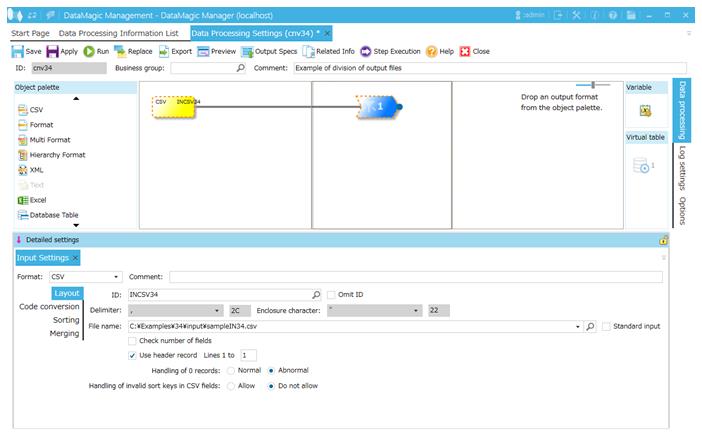
Screen 8.309 Input Settings screen
3. Configure the settings for the output file (C:\Examples\34\output\sampleOUT34.csv).
Select an output file format in the Object palette, and then drag and drop it on the output area. Double-click the icon to display the Output Settings screen.
Configure the settings as shown below.
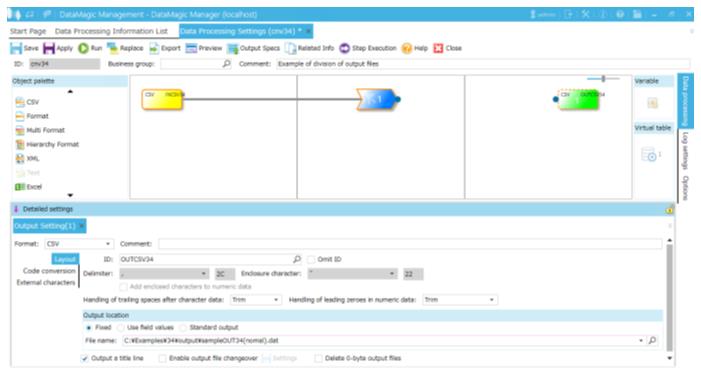
Screen 8.310 Output Settings screen (Normal)
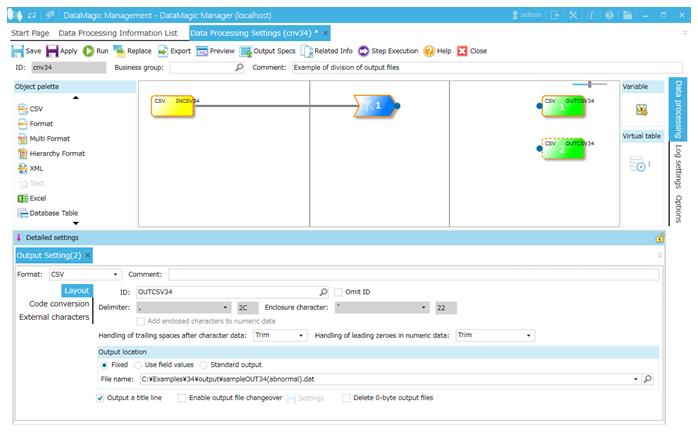
Screen 8.311 Output Settings screen (Abnormal)
4. Setting variables
Prepare variables used to determine whether the values of the respective fields in the record are normal.
Double-clicking the Variable button in the Data Processing Settings screen brings up the Variable Settings screen. Set the fields as in the table below and save the fields.
|
Variable name |
Variable type |
Initial value |
|---|---|---|
|
Employee number flag |
Character string |
|
|
Name flag |
Character string |
|
|
Gender flag |
Character string |
|
|
Department flag |
Character string |
|
|
Flag connection |
Character string |
|
|
Judgment flag |
Character string |
|
5. Setting extraction conditions
Prepare extraction conditions that perform the following processing.
- Extraction condition 1
-
Validates the respective fields in the record being processed, and if all the values are normal, stores Y in the variable judgment flag. If there is even a single abnormal value, stores N in the variable judgment flag.
- Extraction condition 2
-
If the value of the variable judgment flag is Y (that is, if all the values in the record are normal), outputs the information in the record being processed to the output file for normal records.
- Extraction condition 3
-
If the value of the variable judgment flag is N (that is, if there is an abnormal value in the record), outputs the information in the record being processed to the output file for abnormal records.
The following are the settings necessary to prepare those extraction conditions.
1) Creating the extraction conditions
Create the extraction conditions. In the Extraction Condition Settings screen, set as indicated below.
|
Extraction condition name |
Comparison source |
Comparison target |
Operator |
Extraction condition |
|||
|---|---|---|---|---|---|---|---|
|
Extraction condition 1 |
Record |
Input record numbers |
|
Fixed value (numeric value) |
1 |
>= |
1 |
|
Extraction condition 2 |
Variable |
Judgment flag |
|
Fixed value (character string) |
Y |
== |
1 |
|
Extraction condition 3 |
Variable |
Judgment flag |
|
Fixed value (character string) |
N |
== |
1 |
2) Setting mapping information
In the Data Processing Settings screen, use drag-and-drop operation to set mappings as in the following figure.

Screen 8.312 Setting mappings
Double-click the relation lines from 1) to 3) to bring up the Set Mapping Information screen. The following are the settings in the Set Mapping Information screen.
1) Relation line from the extraction condition 1 to variables
Set the variables. Set the output information of the output variables as follows:
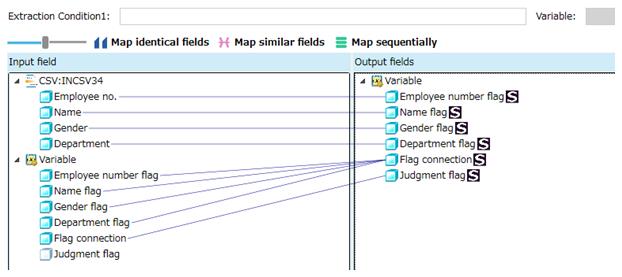
Screen 8.313 Set Mapping Information screen (relation line 1)
|
Variable on the output side |
Output information |
Function |
Meaning of the function |
|
|---|---|---|---|---|
|
Field type |
Field name |
|||
|
Employee number flag |
Input field |
Employee number |
MATCH_REG{^\d{7\}$,Y,N} |
If the employee number is a 7-byte number, converts it to Y, otherwise converts it to N. |
|
Name flag |
Input field |
Name |
MATCH_REG{ ,N,Y} |
If the name does not contain a halfwidth space, converts it to 'Y", otherwise converts it to N. |
|
Gender flag |
Input field |
Gender |
MATCH_REG{^[12]$,Y,N} |
If the gender is "1" or "2", converts it to Y, otherwise converts it to N. |
|
Department flag |
Input field |
Department |
MATCH_REG{^\d\d$,Y,N} |
If the number of the department is a 2-byte number, converts it to Y, otherwise converts it to N. |
|
Judgment flag |
Input field |
Flag connection |
MATCH_REG{N,N,Y} |
If the judgment flag does not contain N, converts it to 'Y", otherwise converts it to N. |
For details about the functions, see DataMagic Reference Manual.
2) Relation line from the extraction condition 2 to the output file (normal)
Set the output format of the output file (normal).
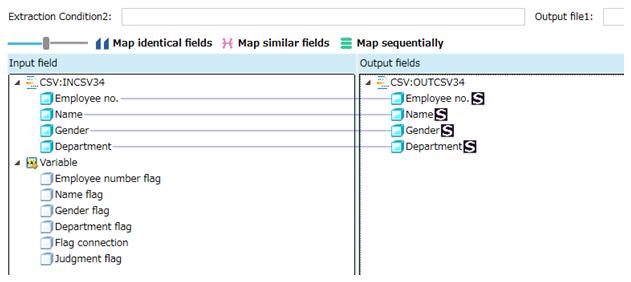
Screen 8.314 Set Mapping Information screen (relation line 2)
3) Relation line from the extraction condition 3 to the output file (abnormal)
Set the output format of the output file (abnormal).
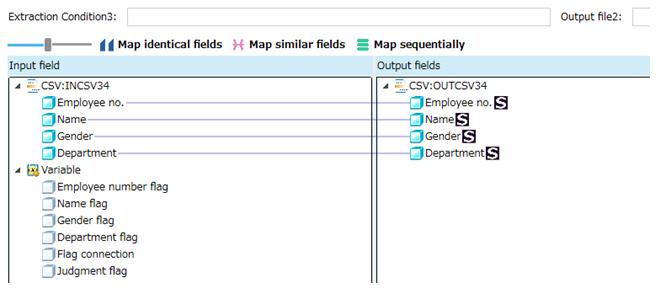
Screen 8.315 Set Mapping Information screen (relation line 3)